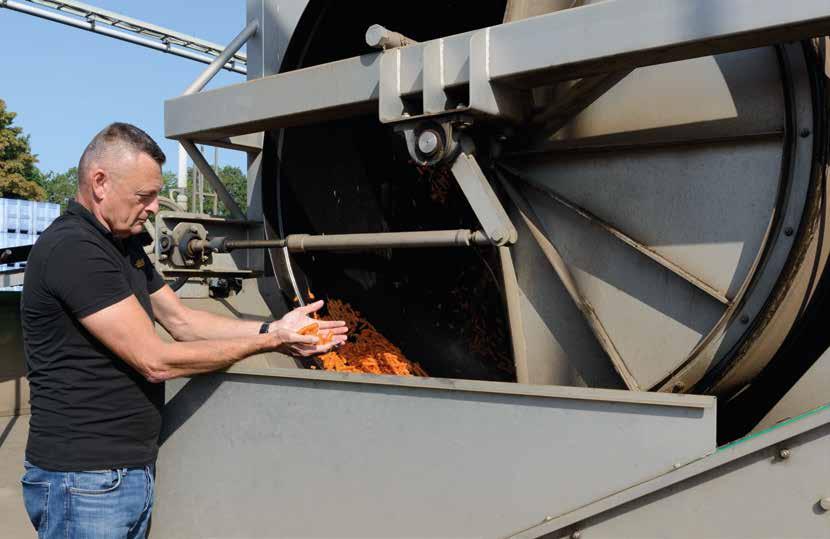
4 minute read
CONTRACT PRODUCTION OFFERS STABILITY FOR THE FARMERS
THE LAARAKKER GROUP WORKS WITH CONTRACT GROWERS TO SUPPLY RAW MATERIALS AND SEMI-FINISHED PRODUCTS FOR THE FROZEN AND CANNING INDUSTRY IN THE NETHERLANDS AND BEYOND. CONTRACT PRODUCTION GIVES GROWERS STABILITY. “WE PRODUCE WHAT THE MARKET DEMANDS,” SAYS AD LIEVENSE.
Dutch frozen vegetables really get around. Ad Lievense of the Laarakker group often visits the southwestern US with his American girlfriend. There, he often runs across the fruits of his labours. “At the supermarket in Arizona, I see vegetables in the freezer that our growers grew in the Netherlands. Cool, right?” In the US, demand for organic vegetables outstrips domestic production, he explains. Growing opportunities are limited because of climate conditions and because suitable land and water are scarce. Hence, the US has become a significant part of the Dutch export market. The Laarakker group knows how to make the most of such opportunities. Based in the southern Dutch town of Well, the business specializes in the cultivation, processing and sale of open-field vegetables, primarily for the frozen and canning industry (see box).
Organic growth continues
Of Laarakker’s production volume, 10% is organic, and that 10% accounts for more than 20% of revenues. The organic portion of the business has grown fast in recent years, says Lievense, who’s the regular contact person for organic contract growers. “I’ve been working here for seven years, and in that time the volume has doubled. And it’s still growing, although I don’t expect it to double again in another seven years.” He expects growth to level off because of the price difference between organic and conventional produce, he says. “I think in the shops a lot of consumers, when they’re facing a choice, do choose based on price.” The cost of cultivation is the limiting factor when it comes to significantly expanding the amount of organic farmland. Weed control is a particular issue, since labour is scarce.
An increasingly important trend
Laarakker supports its contract growers with intensive cultivation advice. It carefully coordinates land use, manuring and crop protection. That means the processor can guarantee its customers in the US and Europe that production will meet their requirements. “Transparency in the chain is a trend that’s getting more and more important for sales,” Lievense says. “Every one of our shipments can be traced to the plots where the produce was grown.” Laarakker’s intensive guidance helps growers to increase profits on their crops.
Experiments
Laarakker regularly conducts field trials and experiments in areas such as weed control. “We look for ways to improve technical solutions such as mechanical hoeing,” Lievense says. “We also
“In conventional cultivation, we learn a lot from organic, and vice versa”
Ad Lievense
look at different sowing distances that can help with mechanical weeding. It might come at a cost to your yield, but if it means you save on labour, it can still be cost-effective.” Weed control isn’t a problem confined to organic cultivation. For conventionally grown vegetables, too, customers are setting requirements around chemical use that are stricter than those required by law. In the search for solutions, organic and non-organic strengthen each other at Laarakker, Lievense says. “In conventional cultivation, we learn a lot from organic, and vice versa.”
Stability
Contract production for industry gives growers stability. As the changing climate creates bigger production risks, that’s more attractive than ever, Lievense says. “Last spring we had to deal with a long cold period and a lot of rainfall locally. In the years before, it was drought and heat. It takes creativity and flexibility to cope with those extremes. We offer support with crop advice and a good choice of varieties, and we have a lot of machinery that allows us to harvest quickly. The main thing is that we and our growers produce what the market demands. For every plot we make agreements for, the sales are arranged.”
LAARAKKER GROUP: CULTIVATION, PROCESSING AND SALE
The Laarakker group is based in the southern Dutch town of Well. Hannes Laarakker started out here with a mixed farm. His son Piet specialized in open-field vegetables, and grandson Frank developed the business into its current form: a group of companies that contracts farmers to grow a wide range of vegetables and processes them for the canning and frozen industry. Laarakker is still a family firm today. It comprises three companies. Laarakker Groenteverwerking focuses on conventional crops; Laarakker Bio handles organic and biodynamic ones.
And subsidiary EcoFuels processes by-products into green energy. The vegetables come from a network of more than 300 contract growers, more than 50 of whom work organically and biodynamically. Together, they farm more than 8,000 hectares of cropland in the Netherlands, Germany, France and Spain. In the Netherlands, cultivation takes place mainly in Flevoland and a few other agricultural areas in the Groningen-Drenthe region, the Haarlemmermeer region and the southwestern Netherlands.
Laarakker’s organic assortment includes pulses, spinach, cauliflower, Brussels sprouts, carrots, parsnips, celeriac, leeks and pumpkins.










